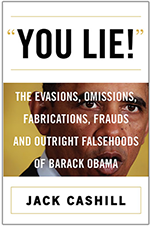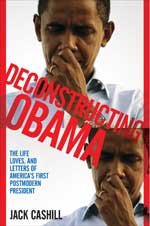The Clintons’ Other, Truly Bodacious
Mine Boondoggle
Get your copy of Jack Cashill's latest book, "You Lie!"

___
Get your copy of Deconstructing Obama

___
Jack Cashill's book:
Hoodwinked: How Intellectual Hucksters have Hijacked American Culture
© Jack Cashill
AmericanThinker.com - April 27, 2015
The New York Times reported this week on the unseemly transfer of cash from parties interested in a major uranium deal to the Clintons. The Canadian company selling Uranium One to the Russians donated $2.35 million to the Clinton Foundation. And Russians tied to the deal gave Bill Clinton $500,000 for a Moscow speech.
The deal had global consequences. It would put one-fifth of all uranium production capacity in the United States under Russian control. So critical was the deal it needed the approval of the U.S. State Department. State approved the deal, and it managed to do so without fanfare. Hillary had failed to disclose the Canadian donors to the Obama White House, this despite her presumed agreement to do just that.
As outrageous as this deal sounds, however, it was not the Clintons most egregious adventure in mining skullduggery. That adventure climaxed nearly twenty years ago-- September 18, 1996, to be precise--when then President Bill Clinton unilaterally transformed a 1.7 million-acre slice of southern Utah into a new national monument.
“We’re saying, very simply, our parents and grandparents saved the Grand Canyon for us,” Clinton told the cheering crowd. “Today, we will save the Grand Escalante Canyons and the Kaiparowitz Plateaus of Utah for our children.” Less than two months before the 1996 presidential election, the national media chose not to ask why Clinton had made so astonishing a move.

The answer could be traced back to the November 1994 mid-terms. On that black Tuesday, Democrats lost fifty-two seats in the House and eight in the Senate. Mario Cuomo lost. House speaker Tom Foley lost. Popular Texas governor Ann Richards lost to underdog George W. Bush. Newt Gingrich now loomed as Speaker of the House.
Bill and Hillary Clinton caught the blame. After days of anger and self-pity, they began to focus again on the one principle that had directed their lives to date, getting Bill re-elected. Not by chance, just a week after the election, the Clintons were heading to the one place in the world most capable of nurturing a comeback, Indonesia, the home base of the Riady family.
The Riadys had bailed Clinton out as governor when he mismanaged Arkansas’ Teacher’s Retirement Fund. They had rescued him with cash twice on the 1992 campaign trail. They had seemingly bought off Clinton aide Webster Hubbell before he had to seek a deal with Whitewater prosecutors. Soon enough, Clinton would reciprocate.
The mood on the Indonesia trip was sour from the beginning. On the seemingly endless flight over, then adviser George Stephanopoulos reported, “The president and Hillary rarely left their cabin.” This could not have been Bill’s idea. What transpired in that cabin is unrecorded—in Hillary’s memoir, Living History, there is no trip to Indonesia—but from this moment on, the presidency would assume a much sharper edge, and Hillary was doing the sharpening.
It was with this trip, for instance, that the CEOs accompanying the Clintons saw their $100,000 donation to the DNC morph from a discreet expectation into the price of admission. With this trip too shadowy figures like Gene and Nora Lum, John Huang, Charlie Trie and Thai citizen Pauline Kanchanalak began to operate in the open. All would later be charged in one scandal or another.
In Jakarta, Bill Clinton quickly got down to business. He chided Democrats for their historic “adversarial” relationship with business and Republicans for their “inactive” one. Boasted Clinton, “We have unashamedly been an active partner in helping our business enterprises to win contracts abroad.” Unashamedly? As to human rights, Clinton made clear that there were different rules for Indonesia than there were for South Africa or Serbia. “We do not seek to impose our vision of the world on others,” he groveled. “Indeed, we continue to struggle with our own inequities and our own shortcomings.”
The CEOs, like John Bryson of Mission Energy, had more important things on their minds than human rights. Bryson wanted the White House to lean on the Asian Development Bank to support a massive new coal-fired electric plant for Indonesia called the Paiton project. Although Paiton was hailed as the first “private” electric plant in Indonesia, “private” had a different meaning in Indonesia than it did elsewhere. In this case it meant owned and operated, at least in part, by the “Indo ruling family,” the Suharto clan.
According to Commerce Department notes from John Huang’s file, a certain percentage of this project was set-aside for a management company owned by Suharto’s daughter. The cut for her and other relatives was to be a $50 million upfront loan to be paid back through presumed profits generated by the plant. This arrangement troubled the ADB, which was reportedly “skiddish” (sic) about offering what amounted to a $50 million bribe to the family of a corrupt oligarch paid, at least in part, by the U.S. taxpayer.
John Huang met with the CIA on the Paiton project as well. What the CIA did not know is after the meeting, according to the Thompson Senate Committee, Huang repaired to “ a secret office” and placed a three-hour call to his former employer, the Riadys’ Lippo Group.
Lippo had a lot at stake. Mission Energy, as it turns out, was part of a larger consortium known as Edison International, and Edison was a Lippo partner. There is more. Suharto’s family had secured an exclusive, no bid, no-cut contract to supply clean coal to the Paiton power plant. The family’s financial backer in his Indonesian coal mining business was none other than Mochtar Riady. The Lippo Group controlled one of the only two commercially viable low-sulfur coalmines in the world, this one conveniently located near the Paiton plant in Indonesia.
The other one just happened to be located in Southern Utah. CNN’s Wolf Blitzer reported that the people of Utah were “furious” with Clinton for signing away their future. They claimed the move was “a land grab” by the federal government “at the economic expense of the state.” Blitzer raised the issue of coal, perhaps $1 trillion worth of clean, low-sulfur coal that would never be mined. Said the president of this grand environmental gesture, “We can’t have mines everywhere and we shouldn’t have mines that threaten our national treasures.”
In her memoir, Living History, Hillary does not talk about the deal. Bill gives it a paragraph in his memoir, My Life. “My action was necessary to stop a large coal mine that would have fundamentally changed the character of the area,” said Clinton. “Most of the Utah officials were against it, but the land was priceless, and I thought the monument designation would bring in tourism income that over time would more than offset the loss of the mine.”
In a stroke of the pen, Clinton had handed the Riadys a monopoly on the world’s supply of low-sulfur coal. One does not need to be a conspiracy theorist to connect the dots between Utah and Indonesia. The FBI had made the connection as well. Consider the following field notes from an FBI interview with Huang:
huang laughed in response to questions concerning j. riady’s interest in Utah coal restrictions. j. riady’s coal interests were minimal. Indonesia had significant infrastructure problems which prohibited the development of its coal resources.
Huang was lying. The Riadys had a powerful interest, and they would exploit it for all it was worth. In fact, at the Paiton plant, the price of the coal exceeded the price of the electricity produced. Each kilowatt generated drove the plant deeper into debt. Of course, this meant there were no profits, which meant Suharto’s family members did not have to pay back their up-front $50 million loan. If this plot sounds familiar, it is because it is nearly identical to that of Mel Brooks’ play and movie, The Producers.
PLN, the state Indonesian power company, caught the drift of the plot. In 1999, the company sued the Clinton administration. Its attorneys charged U.S. officials knew the Paiton power plant contract to be awash in “corruption, collusion, and nepotism” from the beginning. In December of that year, an Indonesian court ruled in its favor. The PLN estimated it had lost over $18 billion in total from Suharto corruption inside U.S. government sponsored power plant contracts.
In September 1996, even if the media had been interested, Bill Clinton made his move too close to the election to allow for serious scrutiny. In April 2015, Hillary Clinton is much more exposed, much too early. If need be, her allies will bury her before it’s too late.
Fire in the hole!



